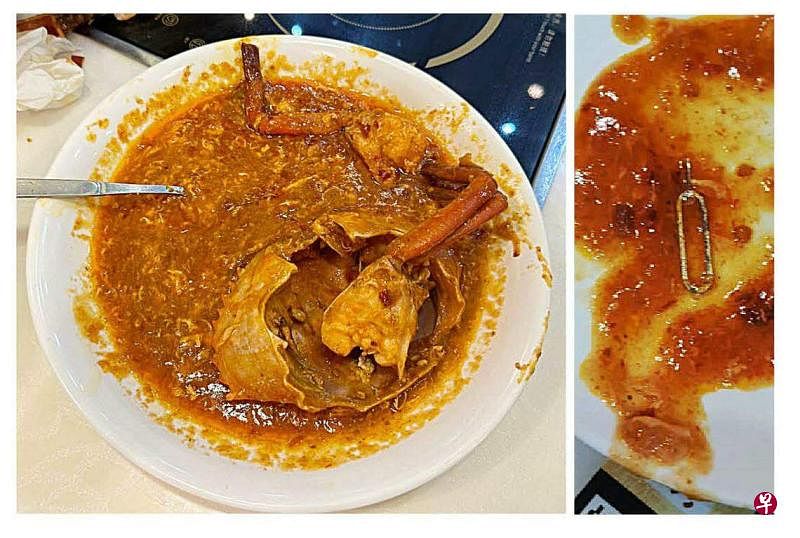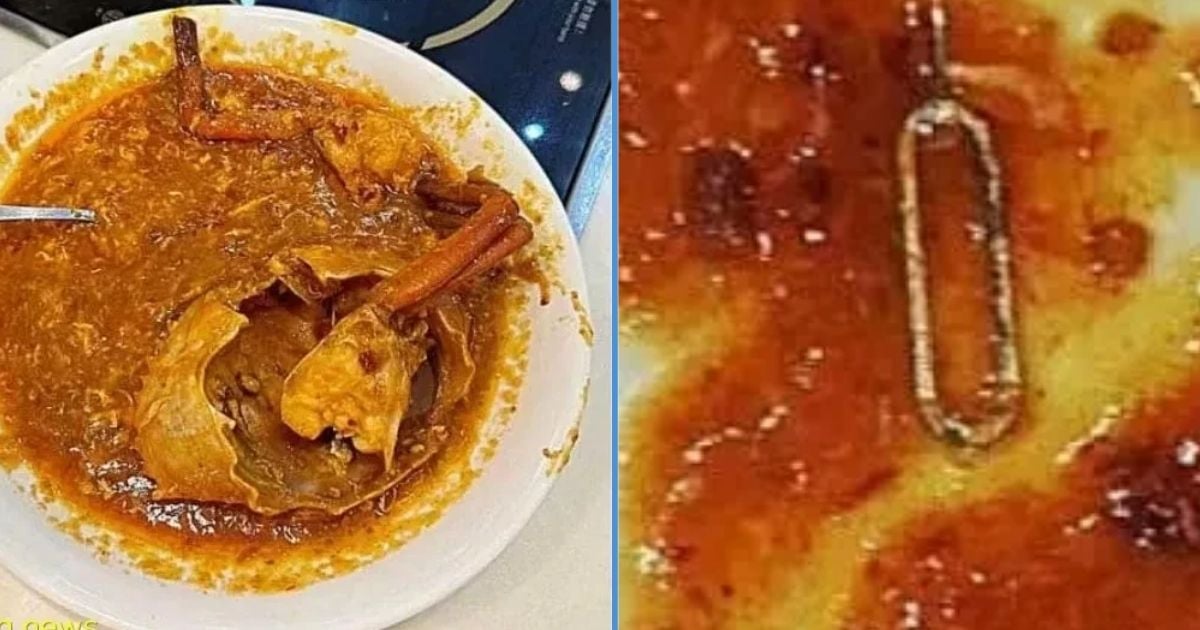Chilli crab is a national favourite in Singapore. From the old to the young, people flock to Singapore to have a taste of the tasty crustacean, which goes so well with deep-fried mantou (Chinese buns).
However, what do you do when you find a foreign object in your dish?
For one 71-year-old patron, the hearty meal almost turned deadly when a SIM card ejector pin was found in the dish’s gravy.
Here is what happened.
71-Year-Old Diner Almost Ate Sim Card Ejector Pin in Chili Crab
Earlier this week, Shin Min shared about one patron’s Mother’s Day dinner gone awry.
Mr Zhang, who is 40 years old, brought his 71-year-old mother to a popular seafood restaurant to eat chilli crab in celebration of Mother’s Day.

What ought to have been a joyous celebration soon turned sour when he found a metal SIM card ejector pin hiding the chilli crab sauce.
The restaurant in question is Uncle Leong Signatures, located in Joo Koon.
According to Mr Zhang, he and his mother had been tucking into the chilli crab dish when he spotted the pin as he scooped some gravy.
He expressed his utter surprise when he found the foreign object in the dish.
Thankfully, Mr Zhang’s eagle-eyed identification of the pin meant that his elderly mother was safe from accidentally ingesting the dangerous object.
He thanks his lucky stars that his mother did not eat the two cm long pin, as it could have meant a trip to the emergency room and a risky operation to retrieve the pin.
In relation to the pin being in the dish, Mr Zhang expressed that he could not understand why the ejector pin was found in the food.
After all, it was not an object which could have been in the food packaging (such as a metal staple).
Mr Zhang hypothesised that the ejector pin could have ended up in the food when the chef changed his SIM card while preparing the food.
Restaurant Tried to Make Amends
After the pin in the dish was found in the dish, Mr Zhang alerted the restaurant staff to the foreign object in the food.
The restaurant then took some steps to solve the problem.
Mr Zhang shared that the restaurant acknowledged the mistake and replaced the dish for the pair.
However, by then, neither of them had any appetite to continue eating.
They dabao-ed (packaged) the rest of the chilli crab and hurriedly left the restaurant.
What a sad end to a Mother’s Day celebratory meal.
Apart from replacing the dish, the restaurant also offered a $20 voucher as a discount to compensate Mr Zhang for the fiasco. However, Mr Zhang rejected this gesture of goodwill by the restaurant.
He shared that he had paid $88 for a 1-for-1 chilli crab voucher and $29 for the other dishes that they ordered.
Mr Zhang also reported the matter to the Singapore Food Safety Authority.
The restaurant did not stay silent upon this fiasco occurring.
When Mr Zhang questioned the kitchen about how an ejector pin could have appeared in the chilli crab gravy, they appeared to deny any responsibility.
The restaurant explained that they, on their part, adhered to strict food safety regulations. Instead, they suggested that it was likely that the ejector pin ended up in the food during the transportation process.
Alternatively, they could not rule out that the pin was already in the crab’s body and hence was not spotted by the chefs preparing the food.
However, Mr Zhang did not buy that explanation. He shared with Shin Min that he thought that the restaurant staff would have noticed the pin if they prepared the food more carefully.
Therefore, it was most likely that the safety lapse occurred within the restaurant during the food preparation stage.
Also, since the pin was in the sauce, it was unlikely that the pin was already in the crab.
While the restaurant apologised and said that it was a mistake, the damage done to Mr Zhang was irreversible.
The restaurant also had more to say.
When contacted by Shin Min, Mr Sun Yong Hua (Hanyu pinyin) told the Chinese publication that they took Mr Zhang’s feedback into account and conducted an investigation into the matter.
Mr Sun was the restaurant manager and the spokesperson for this situation.
After thorough investigations into every staff member who was on duty that day, the restaurant concluded that none of their staff members had used their phones while on duty.
Mr Sun further revealed that the restaurant had a strict company policy which prohibited staff members from using their phones while on shift. Since staff members were not allowed to use their phones, it was even less probable that any staff member could have used a SIM card ejector pin.
Also, the CCTV footage from the restaurant did not reveal any culprits who could have added the ejector pin to the chilli crab.
None of the staff members confessed to the lapse in food safety, either.
Finally, the restaurant apologised again for the incident, saying that although it was an accident, there was indeed more the staff members could have done to ensure the food was safe to consumer.
The restaurant also expressed that they would be more careful in the future to prevent a repeat of this incident.



